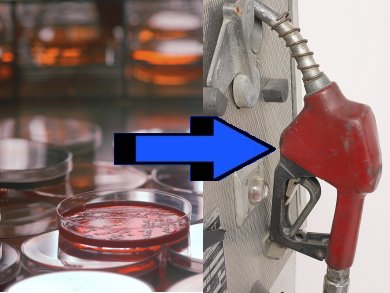Making biofuels from photosynthetic microbes, microalgae, and cyanobacteria, has advantages over crop-based biofuel production in the search for sustainable alternatives to petrochemicals.
Now, researchers at Arizona State University, USA, have taken a step closer to the ideal biofuel brew. By limiting the amount of carbon dioxide available to engineered strains of the cyanobacterium Synechocystis sp. PCC6803, it is possible to trigger membrane degradation and so release fatty acids into the culture broth. The fatty acids recovered from the membranes can then be converted into biofuel.
This “green recovery system” is scalable and could represent a very cost-effective approach to biofuels.
- CO2-limitation-inducible Green Recovery of fatty acids from cyanobacterial biomass
X. Liu, S. Fallon, J. Sheng, R. Curtiss III,
Proc. Natl. Acad. Sci. (USA) 2011.
DOI: 10.1073/pnas.1103016108



